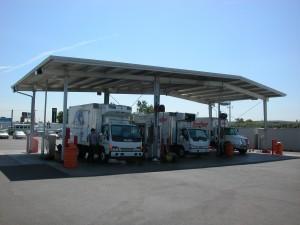
Understanding New Regulations
Fuel costs are a huge, hard-to-predict, fluctuating fleet expense. To complicate matters, all medium and heavy-duty trucks must meet the government’s new fuel efficiency and greenhouse gas standards by 2014. New standards set by the Environmental Protection Agency and the National Highway Traffic Safety Administration state that tractor-trailer units must reduce fuel use and carbon dioxide emissions. Beginning in 2014, tractor-trailer units are required to reduce fuel and CO2 emissions by 20 percent by model year 2018. Fuel efficient vehicles and alternative fuels solutions can help you manage fuel expenses while also heeding the new standards.
Design Matters
With those stricter regulations in mind, manufacturers continue to design and enhance fuel efficient diesel vehicles. They are constantly researching areas such as airflow and wind resistance, and then incorporating aerodynamic features to improve overall efficiency.
Their efforts have proven effective. For a typical Class 8 tractor-trailer combination traveling at 60 miles per hour, an estimated 50 percent of the power output of the truck’s engine is used to overcome air resistance. That aerodynamic drag grows exponentially with vehicle speed. Reducing the drag reduces the energy output required, improving fuel economy.
It’s also important to consider the human side of the equation. Innovative features inside cabs make a real difference. Comfortable cockpits, wraparound dashes and backlit gauges help drivers work more productively and efficiently.
Engine Alternatives
In addition to using fuel efficient diesel vehicles, fleet managers are considering other options for improving fuel consumption, reducing their carbon footprint and saving money. For example, electric vehicles are an ideal approach for high-density intra-city routes. Hybrids – combining a diesel motor and an electric engine – are another popular alternative for tractors, trailers and straight trucks.
Natural Gas
No discussion of sustainability in the transportation industry would be complete without an update on natural gas, the fuel that continues to grow in popularity and accessibility. Natural gas solutions make it possible to reduce fuel costs while benefiting from a stable, domestic, alternative fuel source. Concerns about availability are being addressed throughout the industry and around the country. For example, Ryder’s natural gas fleet and infrastructure is expanding rapidly, with alternative fuels solutions now available in Arizona, California, Louisiana, Michigan and Texas. Further expansions are planned.
You can read more about the new standards set by the EPA on their website. To find out how you can ensure you are meeting the new federal standards with a more fuel efficient fleet, click here.

